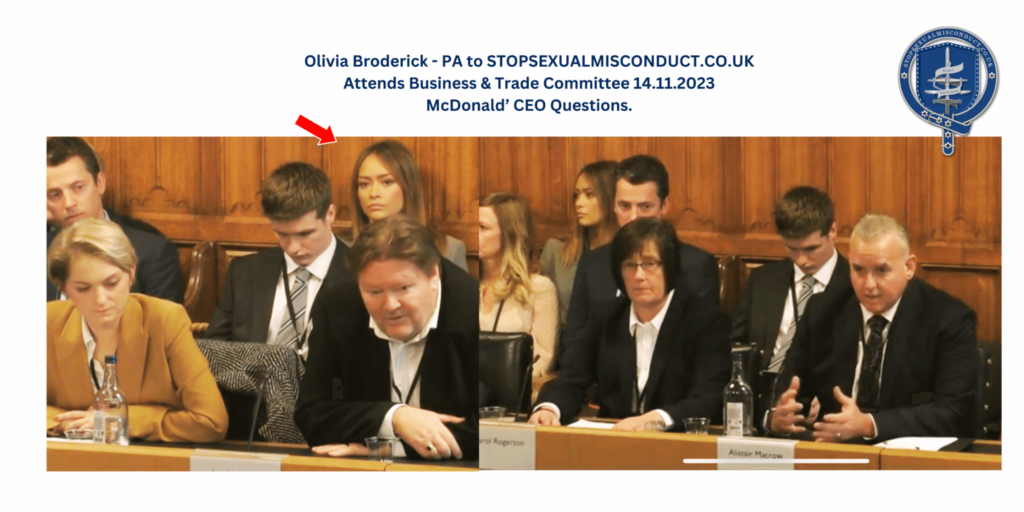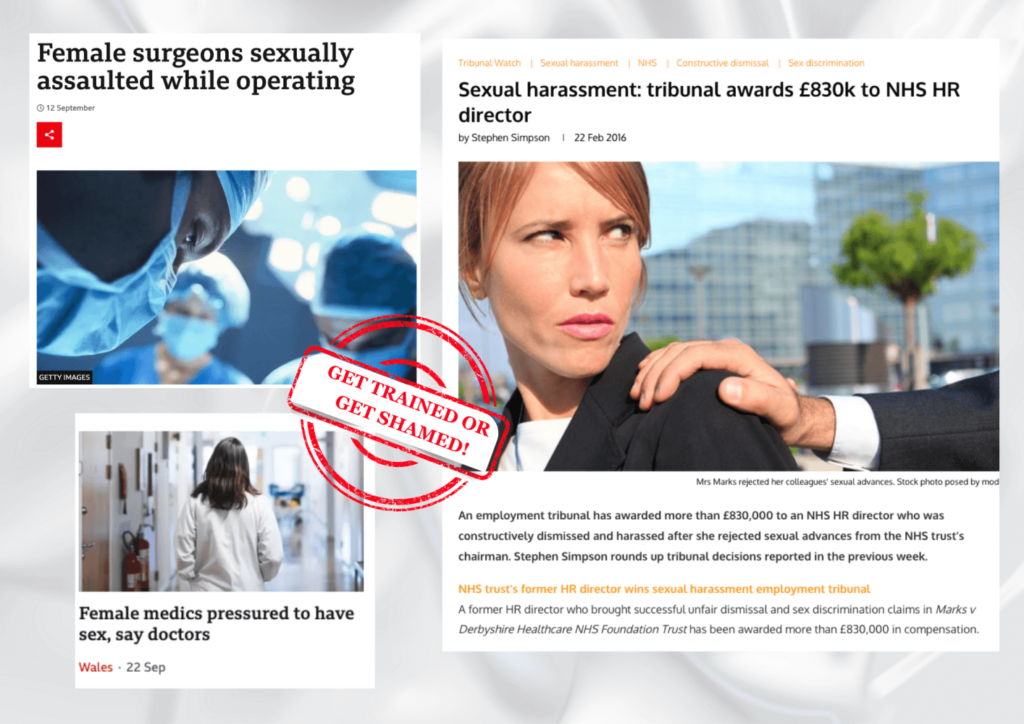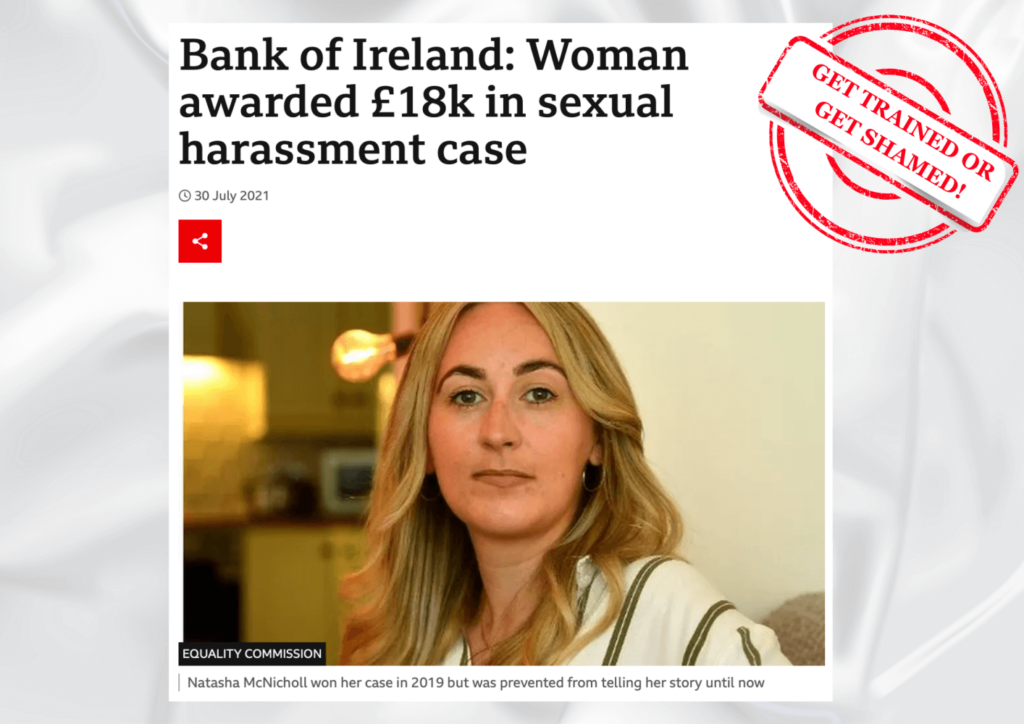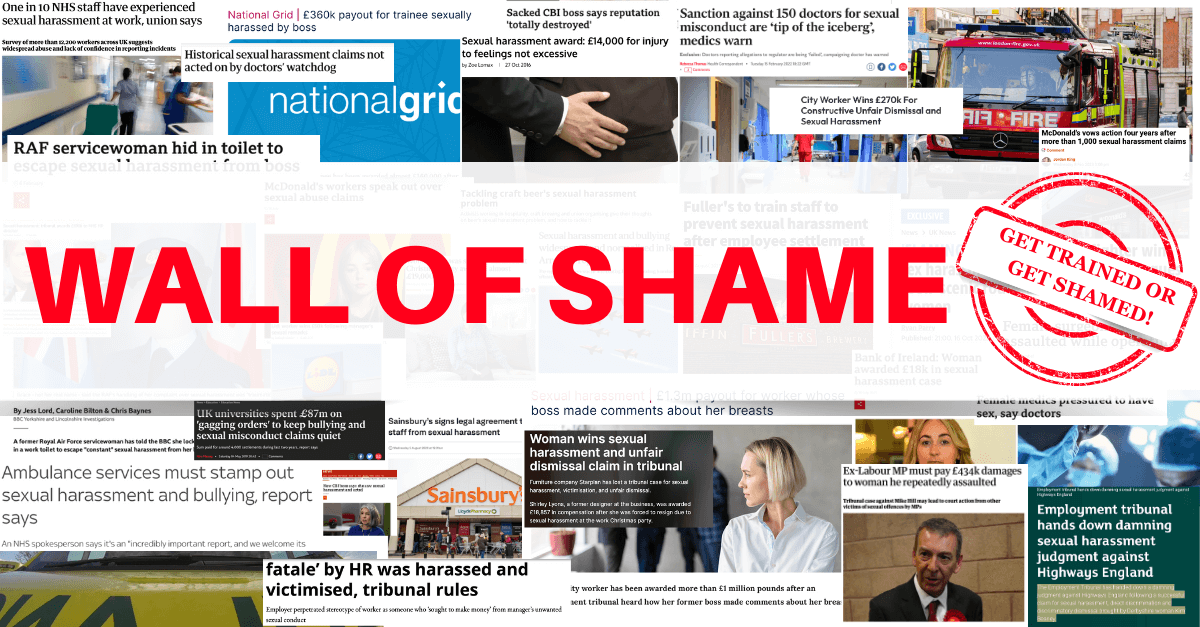In the harsh light of accountability, a “wall of shame” emerges, exposing companies and individuals who have flouted the law and neglected their duty to protect employees from the scourge of sexual harassment in the workplace. These companies and individuals, once held in esteem, now find themselves thrust into the public eye, their names emblazoned across headlines as cautionary tales of corporate negligence. As news of their transgressions spreads like wildfire, so too do the legal repercussions that inevitably follow. No longer able to hide behind a facade of ignorance or indifference, these companies and individuals face the full weight of public scrutiny and legal action for their failure to uphold the rights and safety of their employees.
Take a look at just some of the companies that have fallen short of complying with the law….

Female personnel were subjected to unwanted contact, sexual invitations and unsolicited out-of-work messages, report says-
When incidents of misconduct or wrongdoing tarnish any companies reputation, the damage inflicted is profound and enduring. While steps may be taken to address and rectify the situation, the shadow of mistrust and scrutiny will linger, casting doubt upon their integrity and credibility. Despite their valiant efforts and noble intentions, the public’s perception may forever bear the mark of these unfortunate events. Thus, maintaining the trust and confidence of the public becomes an ongoing endeavour, requiring transparency, accountability, and a steadfast commitment to upholding the values and standards upon which their reputations were built.

“I have gone through two and a half years of hell. I left my job with nothing while he took his pension, and several months’ pay and was covered by £250,000 towards his legal fees. I had to crowdfund my case. The system, even through the courts, is weighted in favour of MPs,” she said.

“Revealed: new claims of sexual misconduct and ‘toxic culture’ at CBI. More than a dozen women claim to have been victims of various forms of sexual misconduct by senior figures at the Confederation of British Industry, including one who alleges she was raped at a staff party on a boat on the River Thames”

The tribunal heard that manager Colin Higgins frequently texted and emailed Emma Tahir, a trainee project supervisor almost 30 years younger than him, repeatedly asked her to remove her jumper and encroached on her physically.
The recent escalation of the average tribunal compensation for claims of sexual harassment from £37,000 to £47,000 serves as a resounding testament to the growing intolerance towards such misconduct. This significant increase underscores a societal shift wherein individuals are no longer willing to tolerate harassment in silence. It reflects a collective outcry for accountability and justice, signaling a crackdown on perpetrators and a demand for safer, more respectful workplaces. As awareness grows and victims feel increasingly empowered to speak out, the upward trend in compensation serves as a clear message: the era of impunity for sexual harassment needs to come to an end.

“The UK boss of McDonald’s has told MPs that widespread cases of sexual harassment and bullying of workers at its fast food shops are “truly horrific” and that the chain was receiving one to two complaints a week about sexual harassment”

All organisations must show that ‘reasonable steps’ have been taken to ‘prevent’ sexual harassment from occurring. Employees need to feel confident that if they do speak up, action will be taken, and the necessary policies and procedures will be followed.
Firstly, a comprehensive preventative training course like our face-to-face, e-learning and webinar Stop Sexual Misconduct within the Workplace Training Courses should offer a deep dive into the complexities of this pervasive issue, providing employees and employers alike with invaluable insights and strategies. For employees, such training instills a deeper understanding of what constitutes sexual harassment, empowering them to recognise, report, and prevent/intervene into such behaviour in the workplace. It also equips them with the knowledge and confidence to navigate challenging situations and seek support when needed. For employers, comprehensive training demonstrates a commitment to creating a safe and respectful work environment, mitigating the risk of legal liabilities, understanding how to deal with a report and the investigation process that follows, reputational damage, and loss of talent.
Clear, robust, and easily accessible policies on sexual harassment (which should be a stand alone from other policies) are essential. Having specific policies to deal with such complaints will ensure that the approach is consistent, rigorous, and compliant.
While bullying and general harassment policies are important, they may not adequately capture the nuances and severity of sexual misconduct. A dedicated policy ensures that employees understand what constitutes sexual harassment, how to report incidents, and the consequences for perpetrators. It also sends a clear message from the organisation that such behaviour will not be tolerated, fostering a culture of accountability and support for victims.

Failure to do so: Facing an employment tribunal for sexual harassment allegations carries weighty legal consequences beyond reputation damage. The potential for massive fines and legal risks looms large, posing a severe threat to the financial stability and even the existence of the organisation. In extreme cases, companies may face closure, necessitating the dismissal of employees to cover the hefty fines imposed.

Even within the esteemed confines of the NHS, an institution dedicated to healing and care, the insidious spectre of sexual harassment lurks. Despite its noble mission, reports of sexual harassment within the NHS serve as a stark reminder that no workplace is immune to such misconduct. Whether it manifests as inappropriate behaviour from colleagues, unequal treatment, or abuses of power, the presence of sexual harassment undermines the trust and integrity upon which the NHS is built. These incidents, though troubling, highlight the urgent need for comprehensive policies, training, and cultural shifts to ensure that every individual within the every organisation feels safe, respected, and empowered to speak out against harassment.

Sexual harassment is not confined to a single industry or organisation and no organisation, regardless of its size or stature, is exempt from adhering to the regulations outlined in the Worker Protection Act. This fundamental legislation serves as a cornerstone of labor rights and workplace safety, ensuring that every employee is entitled to a workplace free from discrimination, harassment, and exploitation. From multinational corporations to small and family run businesses, compliance with these regulations is not only a legal obligation but also a moral imperative.

It’s crucial for individuals to recognise that professional conduct extends beyond the confines of the workplace, even during events such as work conferences. These gatherings are still considered work-related environments, and as such, the same standards of behaviour and respect apply. Unfortunately, there is a misconception that such settings offer a degree of leniency or anonymity, leading to instances of sexual harassment. However, it’s imperative to understand that inappropriate behaviour, comments, or advances are never acceptable, regardless of the location.


The discovery of sexual harassment within colleges and schools, environments entrusted with the education and well-being of children and students, is profoundly troubling and unequivocally unacceptable. These institutions, meant to be sanctuaries of learning and growth, must uphold the highest standards of safety and respect for all individuals. The presence of sexual harassment not only undermines the integrity of the educational system but also poses a direct threat to the physical, emotional, and psychological well-being of students. Such behaviour not only violates the rights of young individuals but also perpetuates a harmful cycle of abuse and trauma. It is imperative for educational institutions to take swift and decisive action to address and prevent sexual harassment, ensuring that every student can learn and thrive in an environment free from fear and intimidation.

A woman who was sexually harassed by a male colleague when she worked in the Bank of Ireland in Belfast has been awarded almost £18,500.

https://www.thecaterer.com/news/fullers-sexual-harassment-training-equality-human-rights-commission
There’s little time for an employer to sit back and gaze at the “to do list” – must tackle ‘sexual harassment’, leaders turn a blind eye. I’m afraid your times up, as the new law comes in to force, employers MUST take a “preventative duty” and “reasonable steps” to stop sexual harassment within their workplace.

https://www.theguardian.com/uk-news/2023/oct/04/soldier-jaysley-beck-took-her-own-life-sexual-harassment-army
Not to mention that the the physical and emotional toll of sexual harassment in the workplace is undeniable, causing lasting harm to victims’ well-being and undermining their ability to thrive professionally and personally. It is imperative for organisations to prioritise prevention and intervention efforts to create safe and respectful work environments for all employees.While the complexity and uncertainty surrounding the interpretation and implementation of the provisions of the new act may initially appear daunting, it’s important to recognise that solutions exist to address these challenges. stopsexualmisconduct.co.uk offers invaluable assistance to employers navigating through this intricate terrain. By providing comprehensive resources, expert guidance, and tailored support, the platform empowers employers to confidently interpret the nuances of the new act and navigate through potential uncertainties. Through clear and accessible information, training modules, and consultancy services, stopsexualmisconduct.co.uk equips employers with the knowledge and tools necessary to ensure compliance with the new regulations while mitigating the risk of missteps. Rather than viewing complexity as a barrier, employers can leverage the expertise and support offered by stopsexualmisconduct.co.uk to navigate through this process effectively, fostering a workplace culture that prioritises respect, safety, and equality for all.
Disclaimer
This information is for educational purposes only and does not constitute legal advice. It is recommended that specific professional advice is sought before acting on any of the information info@stopsml.co.uk © 2024.
